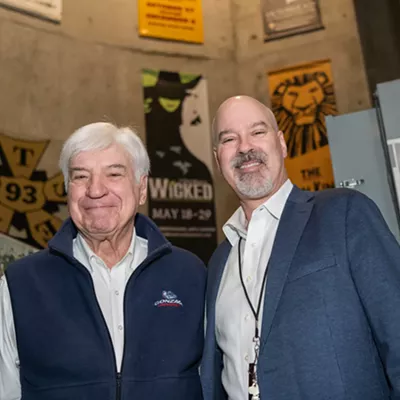It's oddly fitting that at the end of the decade-long River Park Square saga, the last person being blamed is a lawyer. After all, while the city and the developer have both felt the financial pain of a deal gone horribly wrong, dozens of lawyers have cashed in, year after year, to what has added up well into the eight-figure range.
Now, as the federal trial is set to begin (for the third time) in Richland next Thursday, only two parties are left to pick through the charred remains of what were once the best of intentions. And they aren't the two you might have imagined. Three years ago, Vegas odds makers might have picked the final showdown to be between the huge mutual funds that bought the original bonds and Prudential, the huge financial institution that underwrote those bonds. But a funny thing happened on the way to judgment day: The City of Spokane bought out the bondholders, and just last month, Judge Edward Shea ruled that Prudential was no longer liable for any damages caused by the deal they endorsed.
That leaves the city (which has settled separately with six other former defendants to the tune of about $7 million) blaming its former bond counsel, Roy Koegen. And the city hopes to pin all of its remaining damages on him, as they'll attempt to convince a jury he made huge mistakes. If they prove their case, the city will try to squeeze up to $25 million out of Koegen's former law firm, the Seattle-based Perkins-Coie, one of the West Coast's largest.
An Imprudent Decision?
But before looking at what may be the city's last chance at restitution, Prudential's part bears reviewing. After all, you may hear more about them in the future, as the city is not ruling out the possibility that it may appeal Shea's decision to let Prudential off the hook to the 9th Circuit Court of Appeals. Mayor Jim West and Council President Dennis Hession were both surprised by the ruling, but West says a final decision on whether to appeal will wait until after the current trial against Perkins-Coie ends.
It's not hard to understand their disappointment. For years now, many involved in the case have privately pointed their fingers at Prudential Securities as perhaps bearing the greatest legal exposure. By signing off on the Official Statement (OS) -- the prospectus upon which the bonds were sold -- Prudential was essentially vouching for the numbers in the deal. Many deals go bad, and not all investments pan out, but the difference here is that there were false assumptions in the River Park Square garage prospectus. The easiest to prove as false are those related to the parking validation program. Not only was there no formal validation plan in place when the bonds were sold, but most everyone knew the kind of validation program needed was not going to materialize.
Based on depositions taken more than two years ago, it appeared that the bondholders' lead counsel, Gary Ceriani of Denver, seemed to be building a case more against Prudential than against the city or the developer. And you can see why -- Prudential has the deepest pockets of the bunch (even deeper than the Cowles family). At its heart, the entire bondholders' case was all about how the risks of the deal were not spelled out properly in the OS. Prudential was hired specifically to spell out those risks fully and fairly, and, if necessary, pass on the deal if it was too risky.
During the deposition of John Moore, who handled the deal for Prudential, Ceriani wondered why documents showed that questions being raised internally by Prudential executives were never adequately answered and why the firm's due-diligence policies appear not to have been followed. Ceriani also asked why a variety of documents were only referenced in the OS and not attached in their entirety for investors to review. Significantly, the Coopers and Lybrand report, which accurately forecast the garage deal's defects, was only mentioned in the OS and not attached.
In passages from the deposition that sounded like dress rehearsals for a jury, Moore answered Ceriani several times that such documents were "not material," which led Ceriani to his punch line -- that it seemed all the documents critical of Walker Parking Consultants were deemed "not material."
So why did Shea let Prudential out? It's complicated, but Prudential convinced the judge that if the bondholders' original suit had gone forward, Prudential might have taken back the bonds. And the judge agreed with Prudential's valuation of these hypothetical bonds, to the point that their culpability would have been met. If you can follow that, it leads to a question: Perhaps Prudential would have met its financial responsibility related to the mess under this scenario, but the ruling doesn't address the firm's overall responsibility for having embroiled the city in the deal in the first place.
Blame the Lawyer
As settlements have been reached with the city over the past year or so, a subtle game of chicken has been playing out. Prudential and Perkins-Coie have been the least interested in buying their way out of the problem. Prudential, perhaps, just because they're Prudential; and Perkins-Coie, perhaps, because the city was seeking so large a sum. Whatever the reason, nobody blinked, and Roy Koegen is now standing squarely in the city's headlights. The city still could wrangle a last-minute settlement, but that would almost certainly require a later appeal against Prudential -- a costly legal move. This time, it looks like there really will be a trial.
In the early years of the garage issue, Koegen remained a sympathetic player to former city officials as varied politically as Jeff Colliton and Steve Eugster. And like former Assistant City Manager Pete Fortin and former River Park Square Manager Bob Robideaux, Koegen seems to fit the description of decent people devoted to bettering Spokane who got fried for being too close to the fire when it burned hottest. (You can bet the Richland jury will hear this sympathetic interpretation.) But when John Powers took over city government, and after the bondholders filed their lawsuit, the city named Koegen in a separate malpractice suit.
Dealing in the bond markets is a specialized skill, and since most cities need to sell bonds from time to time but don't want to keep full-time bond counsel on staff, the common practice is to hire an attorney for the job. Koegen is considered an expert in the field and has done this kind of work out of Spokane since the mid-1970s (and is still practicing today). Bond counsels get paid a commission out of the size of the bond deal -- kind of like the way a Realtor gets paid when the sale of a home closes. In this case, Koegen was paid about $250,000 for the garage bond deal.
At issue in the River Park Square case is whether Koegen should have advised the city to pull out of the deal when the price of the garage started to shoot up -- or later, when the bottom of the deal appeared to have fallen out. The city will argue that the plan never held water, and that their lawyer was the expert they hired to tell them just that. Perkins-Coie will argue that Koegen provided all the information he had to city officials but that in the end, the client made the decision to help the Cowles build their mall. And that decision, they will probably add, has worked out well for the city, as the project revived Spokane's faltering downtown.
Exhibit A may be the fact that Koegen and Fortin -- the two lead architects of the city's side of the deal -- concluded that the city should only pay $18 million for the garage. The city wound up agreeing to a $26 million price. (The developer wanted them to pay even more.) The city will try to portray this as proof that Koegen knew better but did little to stop the city from entering into a bad deal. Koegen's lawyer -- Seattle's Ralph Cromwell, who specializes in defending lawyers against malpractice -- will likely point out that Koegen merely issued his opinion, while city officials negotiated the final price. Koegen and Fortin have stated that they came to believe the garage could support a $26 million mortgage.
There were other things, too, like Koegen's advice that the city shouldn't purchase bond insurance -- which is costly, but certainly would have been useful in this case. And there was Koegen's elaborate plan to set up a layer of protection for the city by having a separate foundation purchase the garage instead of the city. Many believed that Koegen's foundation scheme wouldn't have withstood legal scrutiny, but we'll never know because the city bought out the bondholders before the issue of who really owned the garage was ever heard in court.
And a question has come up about how Koegen behaved when it became apparent, in the summer of 1999, that a default clause in the deal might be triggered over a dispute over parking plans between AMC Theaters and River Park Square. According to the deal, the foundation would not have to buy the garage if there were any defaults. More important, the negotiations to keep AMC in the mall required changing the parking plans; the city will argue that those changes made the garage's bankruptcy inevitable.
Apparently, Koegen did not inform his clients of these developments, including then-Mayor John Talbott. A basic definition of legal malpractice is keeping information from your clients, so the city will likely tell Richland jurors that the deal would have collapsed if their lawyer had informed them of what was happening.
But Perkins-Coie will likely counter that whether the foundation could have been persuaded to drop out of the deal is an open question -- and besides, AMC never defaulted.
But as has seemed evident all along in this federal case, it looks like it will all come down to the Official Statement. That key document was created by a working group made up of Prudential Securities, the law firm of Foster, Pepper and Shefelman (which has since settled with the city) and Roy Koegen. It was shoddy work, the city's special counsel Laurel Siddoway will argue, and the failure of the city's own lawyer to adequately spell out the risks -- risks he was fully aware of -- brought financial ruin on poor little Spokane. Perkins-Coie will argue that it was a solid OS with plenty of disclosure and that the city and others liked the deal plenty back in 1997.
When the garage deal is boiled down to something called the OS, all the human drama and civic emotion that has characterized the saga seems to be strained out of it. So it falls to the lawyers to engage the jury -- over five weeks starting April 21 -- on all the esoterics of municipal finance, securities law and parking validation systems. In the end, someone will win this fight: Roy Koegen may preserve his good name, or the city of Spokane may make a bad deal seem not quite so bad.
But any victory celebration will be short-lived: Appeals could keep this issue on life support for some time.
To review our archive of stories on River Park Square, dating back to 1995, go to www.inlander.com and click on the River Park Square button on the right margin.
Publication date: 04/14/05




















